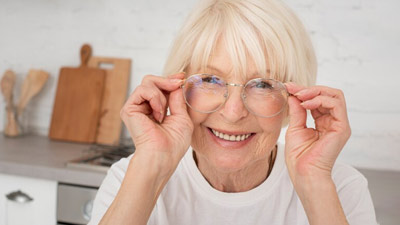
As people become older and eye issues get worse, the risk for eye diseases and ailments rises considerably. The World Health Organization (WHO) estimates that there are 285 million visually impaired persons in the globe and that 82% are 50 years or older. There are 79 million people with visual impairments and over 137 million persons with near vision loss in India.
Table of Content:-
You can protect your vision by knowing when to seek professional eye care consultation. You should be aware of the symptoms of age-related eye conditions that could cause vision loss as you enter your 60s and beyond. To learn more about it, we talked to Dr Ajay Sharma, Chief Medical Director, EyeQ.
Common Eye Conditions that Older Adults Experience
As you age, your vision and eye health can get diminished due to various factors. Here are a few common eye conditions that can affect people of any age but are often brought on by ageing.

Also Read: How High Blood Pressure Affects Eyes In Summer, Expert Weighs In
Six Expert Tips To Keep Your Vision Sharp
Dr Sharma gave six suggestions to keep your vision sharp.
Put on Your Glasses
In macular degeneration, the macula deteriorates over time, resulting in blurriness and, in some cases, blindness. It is crucial to safeguard your eyes by wearing sunglasses because the Ultraviolet (UV) rays of the sun accelerate this process.
Put Away the Screen
Overuse of computers, TVs, and phones can put a great strain on the eyes and cause dry eyes, which can impair your eyesight. It is advised to take breaks every 30 to 40 minutes to cut down on screen time or attempt the 20-20-20 rule, which calls for 20 seconds of looking away every 20 minutes, 20 feet in front of you.
Keep an Eye on Blood Pressure & Glucose Levels

While excessive blood pressure can harm organs, including the heart and eyes, high glucose levels have been linked to diabetic retinopathy, which can result in blindness. If diabetics want to prevent or control diabetic retinopathy, they must constantly monitor their blood glucose levels.
Healthy Lifestyle
Eating well is a requirement for keeping a healthy lifestyle as well as eye health. Eliminating vices like smoking and drinking alcohol, getting enough rest, and exercising regularly are some of the habits you should follow to keep your eyes healthy.
Also Read: Ageing Eyesight: 5 Age-Related Eye Problems & Treatments Everyone Should Know
Recognise Eye-related Issues
You and your caregivers can treat eye-related illnesses more effectively if you are aware of them. Observing and recognising eye diseases is essential to preserving vision, whether it is external damage or an underlying disease.
Regular Checkups
Regular eye checkups aid in the prevention and early detection of eye diseases, preserving your excellent eyesight.

Eye checkups for seniors: Seniors need eye checkups more than they did when they were young. Age-related eye problems must be identified through ophthalmologist-performed eye exams. The following are some of the eye exams that every elderly person must have:
- Test for visual acuity: The lettered eye chart evaluates a person's vision at various distances. Drops are initially applied to the eye to dilate the pupil. This enables the ophthalmologist to see the retina well and search for illness symptoms.
- Tonometry: There are several ways to do this test, which helps to gauge the fluid pressure inside the eye. The most popular technique for checking for excessive intraocular pressure is the air puff test.
Conclusion
Early treatment is necessary for the majority of age-related eye diseases to avoid permanent damage to the eyes. Therefore, depending on their age and risk factors, elderly individuals must get a thorough eye checkup every one to two years.
Image Credits: freepik
Also watch this video
How we keep this article up to date:
We work with experts and keep a close eye on the latest in health and wellness. Whenever there is a new research or helpful information, we update our articles with accurate and useful advice.
Current Version